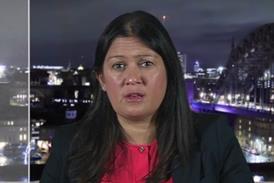Something a bit different from me this week. I've got a guest blogger for you. Paul Hague is the managing director of BIBC, a company involved heavily in the ‘video download revolution'. His company, amongst other things, provides content owners with the technology infrastructure to create their own branded digital stores. Here he calls for the powers-that-be to put in place rules and regulations that will help to encourage a healthy and viable advertising environment for IPTV.
Walking an internet TV tightrope
The IPTV and internet TV industry continues to develop with amazing speed owing more than a little to Ofcom's thus-far, laissez faire approach to industry regulation.
It seems that every man and his dog is looking to take a bite at these new and possibly lucrative content delivery methods and their growing audiences. Whether they are providing nature shows or adult entertainment however, there is currently little to stop them from doing whatever they like
But that's a great thing isn't it? Surely this makes it even more attractive to new entrants to the market? Well yes initially, but in the long-term Ofcom's wait-and-see mentality could spell trouble for many and even finish off others.
Commercial sensibilities
It's easy to look at the BBC's much-loved iPlayer and think that everything is just peachy with online TV. The trouble occurs in the commercial space.
Vendors without the safety cushion of the license fee may encounter complications. Advertisers haven't yet fully caught the IPTV bug and this is going to cause cash flow problems for new IP and online TV entrants. Simply staying afloat will be a major challenge, let alone making any money.
Technology, data and regulation are causing worrisome delays for advertisers in this space. Advertisers want routes for redress if things go wrong. As they don't yet exist, all eyes are now on Ofcom to see how they respond.
Because there aren't many tangible case studies of IPTV/online TV advertising successes or failures (as the industry is still developing), advertisers are looking to Web 2.0 and the social media landscape for guidance and direction which isn't encouraging.
Horror stories abound of mis-targeted adverts ending up on dodgy web pages or in the pay-per-click for risqué search terms so what's to convince them that targeting is any better in IPTV? New technology, little solid data and no concrete regulations to protect advertisers can make the world of online TV a very scary place indeed.
Surprisingly blase
In this regard, Ofcom's approach may seem surprisingly blasé about an industry that is odds-on to become the future of visual content provision and visual advertising. It's obvious that something needs to be done.
Interestingly though, Ofcom isn't abiding by its own hands-off approach across the board.
Indeed, the body is actively encouraging investment in high-speed fibre optic internet, prompting both BT's recent optic fibre investment and Virgin's ongoing rollout.
While it's great to see them supporting this investment, this move will surely add fuel to IPTV fire and extend the possibility of effective and coherent IPTV regulations further from their reach.
.
No one expects Ofcom to march in, guns blazing and start laying down strict regulations. But they do need to start being more proactive and now is the time to take the initiative. The IP and online TV industries have monumental potential and, so far, we haven't even scratched the surface.
Saving the day
So, if Ofcom can begin to construct a framework, it could save all those involved in IPTV a lot of trouble down the line and help us all have a lot more success.
Ofcom is behind the curve in this respect but developing certain rules and regulations could really help to encourage a healthy and viable advertising environment and avoid creating an IPTV wild west.
What it all comes down to is making it as risk-free as humanly possible for advertisers to reach online and IPTV audiences. This way, advertisers will be much more likely to dip their toes, then dive into the world of IPTV as they won't have to face the music unprotected if their intrepid IPTV exploits blow up in their faces.
What do you think? Should online TV be regulated? Have your say below.
If you fancy being a guest blogger email will.strauss@emap.com with your ideas.






























No comments yet